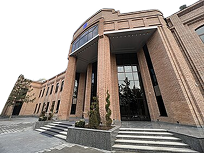

- About NewUU
- Research
- Admissions
- Student life
- News & Events
- Contact us
- About NewUU
- Research
- Admissions
- Student life
- News & Events
- Contact us
M.Sc. in Mechanical Engineering
M.Sc. in Mechanical Engineering
The M.Sc. in Mechanical Engineering program is a dynamic, research-intensive graduate program that cultivates advanced technical expertise and robust problem-solving skills. By blending rigorous theoretical coursework with immersive hands-on experiences and independent research, the program offers specialized pathways in areas such as energy systems, advanced manufacturing, biomechanics, and automation. Emphasizing innovation and interdisciplinary collaboration, students work on projects that address real-world engineering challenges and culminate their studies with a research thesis that contributes original insights to the field. Graduates emerge well-prepared for diverse careers in industry, academia, and research, poised to drive technological advancements in an ever-evolving global landscape.

Course Structure
The M.Sc. in Mechanical Engineering is a two-year master’s program which requires students to complete total of 120 ECTS in four semesters.
Classes are expected to be held four times a week in the morning and afternoon. Please note that the schedule is subject to change.
| Year 1 | ||
|---|---|---|
| Semester 1 – Fall Semester | ||
| Subjects | Course type | Credits |
| Advanced Engineering Mathematics | Core | 8 |
| Seminar in Research Methods for ME | Core | 8 |
| Advanced Vibrations | Core Elective | 8 |
| Advanced Fluid Mechanics | Core Elective | 8 |
| Semester 2 – Spring Semester | ||
| Subjects | Course type | Credits |
| Advanced Thermodynamics | Core Elective | 8 |
| Advanced Continuum Mechanics | Core Elective | 8 |
| Applied Finite Element Analysis | Elective | 8 |
| Combustion Theory and Applications | Elective | 8 |
| Year 2 | ||
|---|---|---|
| Semester 3 – Fall Semester | ||
| Subjects | Course type | Credits |
| Advanced Heat Transfer | Elective | 8 |
| Combustion Theory and Applications | Elective | 8 |
| Modeling and control of Robotic Systems | Elective | 8 |
| Semester 4 – Spring Semester | ||
| Subjects | Course type | Credits |
| Master’s Thesis for Mechanical Engineering | Core | 32 |
Note: The structure of the course is subject to change.
Entry requirements
- Bachelor degree from an accredited institution (minimum 180 ECTS credits) or a higher academic qualification (degree course format should be full-time or part-time)
- A pass in Mathematics and Physics Entrance Exam
English language requirements
Proficiency in the English language as evidenced by one of the below:
- IELTS 5.5 or higher
- TOEFL iBT 46 or higher
Note: We accept only the TOEFL iBT taken at approved test centers. We do not accept the TOEFL iBT Home Edition.
- CEFR B2 (51-55)
Applicants who have completed their bachelor’s degree entirely in English do not need to provide any additional proof of language proficiency.
Exam Format
- Total Duration: 60 minutes
- Total Number of Questions: 40
- Total Marks: 40
- Mark Per Correct Answer: 1
Calculator Policy
Allowed:
- Standard calculators
- Simple calculators
- Non-graphic calculators
Not Allowed:
- Models with internet access or wireless connectivity (Bluetooth, cellular, etc.)
- Models with audio/video recording or playback, cameras, or smartphone-like features
- Models with a computer-style (QWERTY) keyboard, pen input, or stylus
- Models requiring an electrical outlet, making noise, or using paper tape
- Programmable calculators
- Calculators capable of plotting functions
Exam Date and Deadline for Registration
| Exam Date | Deadline for Registration |
|---|---|
| 26th April | 18th April |
| 14th June | 6th June |
| 23rd August | 15th August |
Fees and Funding
| Tuition Fee for 2025/2026 Academic Year | |
|---|---|
| Local students | 15 000 000 UZS per academic year |
| International students | $ 2 200 USD per academic year |
Career Perspectives
Design Engineer – Develops innovative products and mechanical systems using CAD software and engineering principles to improve functionality, efficiency, and sustainability. Works in industries such as automotive, aerospace, and consumer goods.
Manufacturing Engineer – Focuses on optimizing production processes, improving efficiency, and ensuring quality control in manufacturing facilities. Implements automation, lean manufacturing, and process improvements to enhance productivity.
Research and Development Engineer – Engages in the creation and testing of new technologies, materials, and mechanical systems. Works in industries such as robotics, biomedical engineering, and advanced materials to push technological boundaries.
Energy Systems Engineer – Designs and optimizes sustainable energy solutions, including renewable energy systems, power plants, and HVAC technologies. Plays a key role in improving energy efficiency and reducing environmental impact.
 O'zbekcha
O'zbekcha
 Русский
Русский
 English
English
